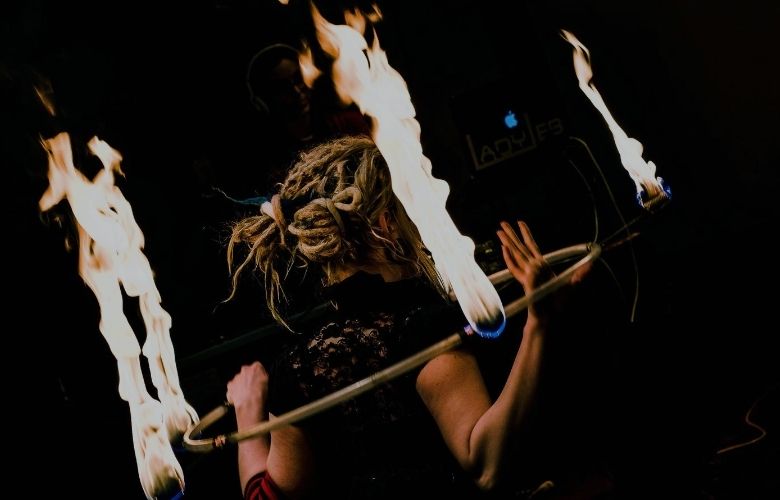
In the early days of the COVID-19 pandemic, that is, April of 2020, En Piste1, Canada’s circus arts alliance, surveyed performers, cultural workers and circus companies in Canada. A staggering 66% reported that they are considering a career change. And while Performing Arts professionals are not alone in their COVID-19 imposed challenges, we are certainly distinct in that the industry as a whole will not only take time to rebound and recover, it will also have to redefine itself.
This is a level of uncertainty that far exceeds the typical arts industry employment instability.
We’ve lost our jobs, our contracts, our livelihood. We’re grieving the loss of our passion. Our industry colleagues are suffering, and for many, their very identity is in question.
But if there’s one thing performers have in spades, it’s agility. Contortion jokes aside, performers are skilled at changing course at a moment’s notice. No green light from stage management? Act, react, fill the time. Equipment malfunction? Quick: make a new plan. Missing a key contributor to the act? Reshape, review, don’t miss your cue. Stay focused and be attentive.
As a talent scout turned casting director, I’ve hired a generous handful of performers whose competencies guided rich on-stage careers. When it came time for them to transition off the stage, you can be sure I reflected on what they would bring to the team of people working behind the scenes.
Looking ahead then, and for some, beyond the stage, let’s review what great performers have in their toolkit, and why they should be on your hiring radar for off-stage work and career transition opportunities.
Risk takers. Risk can take many forms: physical, emotional, artistic… the performing arts industry is volatile at the best of times, and isn’t known for its job security. Performers are bold, driven, and ready to embark on journeys into the unknown.
Adaptable. Socially, culturally, in changing environments… whether it’s life on tour, a humid stage surface or working with an international cast through an interpreter. Each day – indeed, each show – offers surprises, and “rolling with it” is a winning mindset.
Calm under pressure. Don’t mistake a “roll with it” mindset as indifference; performers work hard to balance the demands of their career. Performing live to hundreds or thousands of paying audience members requires a well-honed level of stress management.
Hard working. This industry is… hard work. Performers are skilled at goal-setting, staying focused and putting in the time. One doesn’t “make it” without honest, hard work.
Determined. See above! You really need to want it to succeed in this business.
Passionate. You really need to love it to succeed in this business.
Disciplined. You really need to work it to succeed in this business.
Time management masters. Combining travel, training, rehearsals, warm up, cool down, show schedule, fitness and physiotherapy and nutrition, family, personal stuff! Performing life has so many variables that controlling one’s own routine is an essential survival skill.
Team players. In the Performing Arts, there really is a greater good. Sure, we all have egos, but a truly successful performer knows the whole is greater than the sum of its parts. The audience knows it too.
Collaborators. A close cousin to team player, performers know how to propose and bounce and evolve ideas in the communal ring.
Punctual. The show starts on time and the bus doesn’t wait. Lesson learned.
Health and wellness embodied. Performers understand the value of being in top shape mentally and physically – their livelihood depends on it. As a result, performers can be a great example for other employees. Wellness is practiced, and we’ve acknowledged that performers know how to practice. And wellness leads to productivity.
Open minded and inclusive. Performers know the value of a positive work environment. Long workdays in close quarters with diverse personalities from varied cultures underscores the importance of respect, acceptance and understanding among colleagues.
Open to feedback. It’s the industry norm to be on the receiving end of notes, corrections and criticism. Performers learn to be okay with being vulnerable and they seek feedback to learn and grow.
Coachable. An extension of the above, coachable suggests that feedback is not just listened to, but heard. Change happens. Who wants the same note night after night?
Curious. Creative. Problem solvers. Performers are Design Thinkers!
Performers are Good Communicators. They listen and they observe. They connect and they express: verbally, vocally, through an instrument or an apparatus or a physical movement.
In a time when uncertainty reigns and so much talent idles, performers are what companies need to fuel innovation and to truly be agile.
It’s a perfect time to ask, “Who are you, and what’s in your toolkit?”
It might just help all of us rebound and recover, and redefine ourselves.
References:
1 En Piste, National Circus Arts Alliance
“Impacts of COVID-19 on the circus arts sector in Canada”
Thanks to:

About the Author: Stacy Clark is the founder of Projet Lumiere Project, which is a hub for Circus professionals through Covid-19. Prior to the lockdown, Stacy was Director of Casting at Cirque du Soleil, leading a team of international scouts and advisors in Montreal, Las Vegas and Europe. A former gymnast and professional circus performer, Stacy worked in marketing and communications before leaving it all behind to perform and teach circus around the world on stage, at festivals and on screen. Stacy’s journey at Cirque du Soleil began in 2007 when she joined the Casting department as a Talent Scout, recruiting athletes and circus artists for the company’s shows worldwide. In 2011 she became Acrobatic Coach with Cirque du Soleil’s Amaluna, touring North America.
The Human Library: Check Out Real People
Ali Wright Photographs Theatre Staff Working As Key Staff during COVID


Guest Posts are written by featured authors who are not frequent contributors to TheatreArtLife. Details of the contributor can be found within each article unless the author wishes to remain anonymous. If you would like to submit a guest article to TheatreArtLife, please visit TheatreArtLife.com/Contribute or select CONTRIBUTE in the menu.
Read Full Profile© 2021 TheatreArtLife. All rights reserved.

Thank you so much for reading, but you have now reached your free article limit for this month.
Our contributors are currently writing more articles for you to enjoy.
To keep reading, all you have to do is become a subscriber and then you can read unlimited articles anytime.
Your investment will help us continue to ignite connections across the globe in live entertainment and build this community for industry professionals.